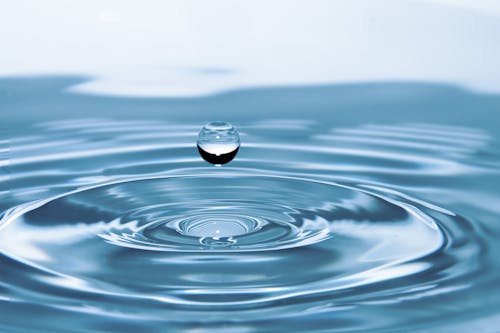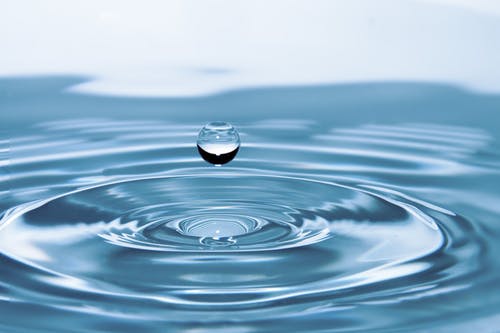FROM THE DESK OF… THERESA SABATELA
Wellness & Life Coach
Tmsabaatela @aol.com (305) 854- 6165 (786) 260- 2926
Mineral Water
Mineral water “contains up to four times as much calcium and magnesium as regular tap water. One study found that people whose drinking water was low in magnesium were able to lower their blood pressure by drinking a litre of mineral water every day.”
While mineral water has gotten a bad rap of late, it does have benefits. However, considering the above statement (an except from quickanddirtytips.com), we cannot solely rely on this type of water for essential mineral intake. Increasing your intake of this type of water, coupled with magnesium and calcium supplements should do the trick.
However, this type of water should be kept far away from deposit-building appliances, like kettles, irons and coffee machines. The added calcium will cause a lime-scale build up when used too often.
Distilled Water
“Distilled water tends to be acidic and can only be recommended as a way of drawing poisons out of the body. Once this is accomplished, the continued drinking of distilled water is a bad idea. Water filtered through reverse osmosis tends to be neutral and is acceptable for regular use provided minerals are supplemented.”
This except has been extracted from mercola.com indicates a few things, but firstly understanding that distilled water is simply water that has had many of its impurities removed through distillation.
Distillation involves boiling the water and then condensing the steam into a clean container.
This type of water, as mentioned above, is great if you (for example) have a bladder infection and need to keep hydrated. This type of water will assist in helping the infection move past, but as soon as possible after the infection has cleared, drinking of purified water is suggested.
A possible reason distilled water may be sufficient at drawing toxins is that it contains no additives, and as such can bond with toxins and allow for quicker detoxification.
De-Ionised Water
“Deionized water, is simply water from which the ions have been removed. Ordinary water contains many ions, such as Cu2+, Ca2+, and Mg2+. These ions most commonly are removed using an ion exchange process. Deionized water may be used in laboratory situations where the presence of ions would cause interference or other problems. Important Note: Deionized water is not necessarily pure water. The purity depends on the composition of the source water. Deionizing does not remove pathogens or organic contaminants.”
De-ionised water is simply not a suggested drinking water type; it has great use in laboratories and oxygen-assistance breathing apparatus, as the water allows for better functioning of the oxygen apparatus. Any drinking use is not suggested, for the following reasons.
(Initial statement excerpt and reasons listed below are from thoughtco.com):
1) Deionized water lacks minerals normally found in water which have beneficial health effects. Calcium and magnesium, in particular, are desirable minerals in the water.
2) Deionized water aggressively attacks pipes and storage container materials, leaching metals and other chemicals into the water.
3) Drinking DI water may lead to increased risk of metal toxicity, both because deionized water leaches metals from pipes and containers and because hard or mineral water protects against absorption of other metals by the body.
4) Use of DI water for cooking can lead to loss of minerals in food into the cooking water.
At least one study found ingestion of deionized water directly damaged the intestinal mucosae. Other studies did not observe this effect.
“Long term use of deionized water as drinking water may cause organ damage, even if additional minerals are present elsewhere in the diet.”
5) Distilled and DI water has been shown less able to quench thirst.
6) Deionized water may contain contamination in the form of bits of ion exchange resin.
It’s also important to note that while deionized water made from distilled or reverse osmosis purified water may be pure, deionizing non-potable water will not make it safe to drink!
Spring Water
“Spring water is considered to be free of most contaminants typically found in drinking water. It also contains a level of minerals that is beneficial to health for most living things. Mineral-rich water will usually have a neutral or slightly alkaline pH.”
As waterbenefitshealth.com explains from this excerpt, “… if you are buying bottled spring water and intend to drink it on an ongoing basis, it would be worth your while to thoroughly research the bottlers to find out what their water source is and how often the water is tested for contaminants.”
While Spring water contains minerals similar to those in Mineral Water, be sure to check the bottler’s information listed and see if the water you’re drinking is bottled from, as in most instances, all it takes for water to be labelled as Spring water is that it “comes from water that flows to the surface from a clean underground water source.”

Purified Water
“It’s healthy because it packed full of essential minerals like Calcium, Magnesium and Potassium that your body needs.”, states virginpure.com.
While you know Aquazania produces only purified water, it’s important to understand what it takes to get this standing name.
Purified water should have undergone many processes.
Our processes include sterilisation, reverse osmosis, sediment filtration and mineral re-injection, amongst others. This means that bacteria, impurities and any contaminants have been removed from our water – to the point where we require mineral- re-injection to lend that unmistakable taste back to our water.
This is your safest bet when drinking water on a daily basis. Using it for cooking as well as baby’s bottles. This type of water requires no further sterilisation, and when drunk on a daily basis, places no undue stress on organs or over mineralisation of our system.
WATER
How long can the Human Body Survive without Food?
Humans can survive without food for 30-40 days (About 5 weeks).
What about without water?
Without water life will end in 3 to 5 days.
The average person’s body is composed of:
Seventy Percent water.
Body’s water content:
Varies considerably from person to person and even from one body part to another.
Body’s Water Supply:
Is responsible for and involved in nearly every bodily process, such as;
- Digestion
- Absorption (Primary transporter of nutrients throughout the body.
- Circulation
- Excretion
Transporter of nutrients:
Is the primary transporter of nutrients and Oxygen to the cells and the blood, throughout the body Primary, remember anabolism and catabolism?
Regulates body temperature through perspiration:
Water maintains normal body temperature.
Detoxifies the body:
Carries waste material out of the body
Replacing water that is being eliminated:
Throughout the system of elimination is imperative
Decline in our blood volume:
A drop in the body’s water content causes a decline in blood volume, in turn this triggers HYPOTHAlamus

Quality water is beneficial for all disorders know Especially important for people who have musculoskeletal problems such as:
Arthitis
- Bowel
- Bladder
- Headaches
- Anxiety Attacks
- Food intolerance
- Acid stomach
- Heart Burn
- Muscle pain
- Colitis pain
- Hot flashes
- Chronic fatique
High level of Toxins in the system:
If not enough water is consumed toxins will buildup in the system causing headaches.
The most important Detox:
Water through the system of elimination flushes out toxins. A big sign of this is muscle aces and pains as having fever or feeling your body very hot.
Poisoning ourselves:
Without adequate water, we would poison ourselves with our own metabolic waste. The kidneys remove waste products such as:
- Uric Acid
- Urea
- Lactic Acid
All of these must be dissolve in water. If there is not enough water available to remove these substances effectively, they may cause damage to the kidneys.
Digestion, Metabolism, Enzymes and chemical reactions in the body, depend on water: Digestion and your Metabolism also rely on water for certain enzymatic and chemical reactions in the body.
Water is essential for Breathing:
Water is essential for breathing because lung tissue must be moist to facilitate oxygen intake and carbon dioxide excretion.
- Body functions being impaired
- Your Fluid Balance
- The more active you are:
Approximately one pint of liquid is lost each day through exhaling. If you do not take in enough water to maintain fluid balance, every bodily function can be impaired.
Inadequate water consumption may contribute to:
- Excess body fat
- Poor muscle tone
- Digestive Problems
Poor functioning of many organs including:
- Brain
- Joint
- Muscle Soreness
- Paradoxically
- Water retention
Consuming plenty of quality water can;
- Slow aging process
- Prevent and improve arthritis
- Kidney stones
- Constipation
- Arteriosclerosis
- Obesity
- Glaucoma
- Cataracts
- Diabetes
- Hypoglycemia
The right amount:
Ten glasses (80 ounces daily)
Finding quality water, would seem an easy task, however due to the differentiae’s of classification, that water is given today, the consumer may be confused in selecting the right water. In my next article I will be breaking down this classification. In my next article I will offer a guide to understanding what the most commonly used classification of water mean and how these different kinds of water may help or harm the body.
Top Water
- The Safety of Top Water
- Ground Water
- Hard versus Soft Water
- Fluoridation
- Water Analysis
- Improving Top Water in the Home
- Home Water Treatment Methods
Specialty Waters:
- Bottle Water
- Artesian Water
- Deionized Demineralized Water
- Mineral Water
- Natural Spring
- Sparkling
- Steam Distilled


 Contact Us
Contact Us